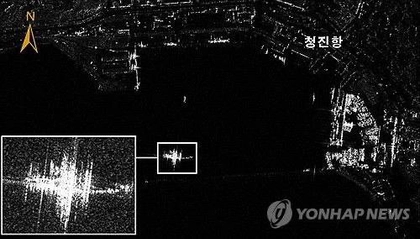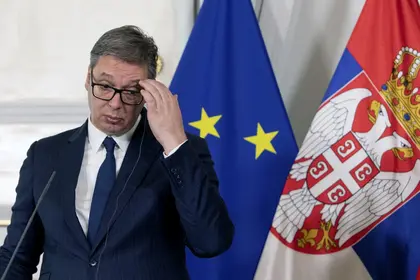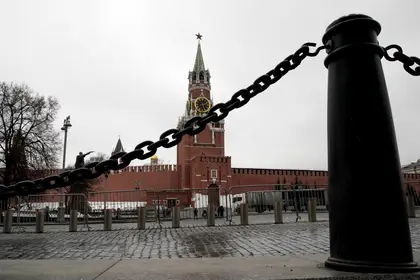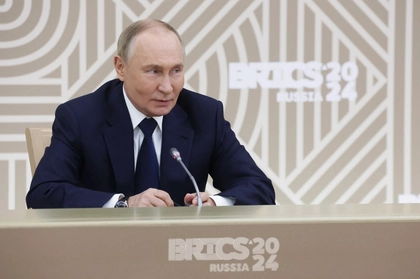The President of Serbia, Aleksandar Vučić, recently said there are no sanctions against Russia because 85 percent of Serbian citizens support and love Russia.
Is this policy of the Western Balkans’ largest country sustainable in light of Russia’s exclusion from the rest of Europe, the West, and civilization? The answer is no, and only one question merits consideration: When, not if, a significant change will occur?
JOIN US ON TELEGRAM
Follow our coverage of the war on the @Kyivpost_official.
Serbian President Vučić does not exaggerate when he talks about the huge percentage of Serbian citizens who have friendly feelings towards Russia. But that is not a parameter according to which a statesman should make the right decision for his citizens. His job and state obligation are to set aside the majority’s feelings, the fundamental question being how sincere they are, and make choices based on reason and facts.
Contrary to this sentiment, there are compelling rational reasons why this decision should be reversed. Western partners are losing patience with Serbia because of its reluctance to join the strongest European response to Moscow’s state brutality and crimes since World War II.
Everyday life of not only these 85 percent, but of all the citizens of Serbia is firmly connected to Europe, not Russia. Two-thirds (about 61 percent) of Serbia’s trade is with EU economies, with Russia only about 5 percent. Of all foreign investments in Serbia, which are by far the largest in the region, almost 70 percent come from the EU and less than 10 percent from Russia.

Up to 12,000 North Korean Troops Transferred to Russia, Satellite Images Show
Along with domestic companies, Western investors are by far the largest employers in Serbia, with hundreds of thousands working in their companies. What will the Serbian economy give up when (and not if) it imposes economic sanctions on Russia – a little less than a billion dollars in exports, mostly of food and industrial products (of course, before the Russian aggression against Ukraine)? That is less than Serbia exports to neighboring Bosnia and Herzegovina ($1.35 billion) or almost as much as it exports to Kosovo, which it does not even recognize as a state.
In anticipation of a change in Serbian policy towards Russia, an analogy with 1948 is appropriate, when the leader of the then Yugoslavia, Tito, severed ties with the USSR and Stalin. It was incomparably harder for the leader of communist Yugoslavia to make that decision than it is for Aleksandar Vučić today, because he had hundreds of thousands of Soviet soldiers and their allies on his borders with Hungary, Romania and Bulgaria ready to invade Yugoslavia at any moment.
At the same time, sentiment towards Stalin was so strong that thousands of Stalinists in Yugoslavia were prepared to support the invasion from within, even at the cost of long-term imprisonment. Many Yugoslav generals and security officials considered Moscow and Stalin their bosses, not Belgrade and Tito. They were ready to die for the USSR and Stalin.
Today, there is no such threat in Serbia. More significantly, Serbia is surrounded by NATO member countries. And regardless of one’s feelings toward Russia, no one in Serbia would be willing to go to prison, let alone die, for Putin.
Tito’s decision was dangerous, not only for the country and the Yugoslavs, but also for him personally. Stalin was constantly attempting to assassinate Tito, with as many as 22 assassination attempts recorded. This was a clash with the then-USSR, incomparably stronger than Russia today. The risk was incomparable to the few consequences that today’s Serbia could have, yet the decision was reached regardless.
The fact is that Russia has been behaving destructively towards Serbia for years, treating it as its province, convinced that everything is allowed. Russian intelligence services are the principal exponent of that aggressive attitude, not only towards Serbia but also towards the entire Western Balkans.
Finally, regarding the “umbilical cord” connecting Serbia and Russia, which is the alliance regarding Kosovo, we may conclude that it was severed on Feb. 24, 2022, when Putin attacked Ukraine. Isolated from the most important international forums, Russia is now rejected by the world community. No one needs its support anymore, nor is it possible.
Moscow will continue to say that it is protecting Serbia and Kosovo, both in the UN and other important organizations, but that is what the helpless and isolated bully, whose voice is worthless in international relations, says. Isolated from the Security Council, with significant decisions being transferred to the General Assembly, expelled from the Council of Europe and UN Human Rights Council, under possible suspension from the OSCE and even from the UN Security Council, and several international forums, Serbia does not need such a Russia. Serbia must distance itself and turn to its own interests.
Russian supporters in Serbia frequently say that Moscow has never imposed sanctions on Serbia, which is simply not true. Out of about 150 resolutions passed by the Security Council in the early 1990s regarding the disintegration of Yugoslavia, a dozen provided for penalties and sanctions against the then FR Yugoslavia, that is, sanctions against Serbia, and none had a Russian veto. It began with a ban on arms exports on Sept. 25, 1991 (Security Council Resolution 713), until May 30, 1992 (Security Council Resolution 757), when an economic blockade was imposed on Serbia and Montenegro, followed by expulsion from the UN.
Russia continued this attitude towards Serbia on the eve of the 1999 bombing. Peace Resolution 1244, which ended the bombing of Serbia, was preceded by four UN Security Council resolutions warning Serbia of violating the peace (resolutions 1160, 1199, 1203 and 1239), an embargo on arms imports (UN Security Council Resolution 1160), and a request to the Hague Tribunal to collect information on crimes in Kosovo (Security Council Resolution 1199 of Sept. 23, 1998), all with the support of Russia, because that was in its interest.
Clearly, Russia has frequently engaged in the imposition of sanctions on Serbia. So now, when Belgrade should retaliate with a similar measure, there should not be any consideration for Moscow. Serbia will respond to Russia with the same approach it has seen multiple times in recent history by joining the EU sanctions.
Today’s Russia, after the brutal invasion of sovereign Ukraine, cannot be a choice because support for crimes cannot be a choice for any nation and its leadership. Today, being a friend and associate of Putin’s Russia means being an accomplice. It is no longer a question of geopolitical affection for a particular side but a question of civilization. Putin’s Russia is behaving like a gang of thugs.
Serbian President Vučić has a historic chance to secure a permanent place for his country in the family of the most advanced nations. He is a man who wants to be remembered for something great, to leave a legacy. Now he has a chance. He should not think about public opinion polls because a true statesman leads his people, does not follow them. That’s why they choose him.
Vučić has already made many difficult decisions during his 10 years in power. At the beginning of his mandate, he reduced the already low salaries and pensions because it was necessary to consolidate the chaotic public finances. I am convinced that the vast majority of Serbian citizens would have been against such a decision, if he had asked them. But he did not; he made that decision because he knew the state would go bankrupt if it did not implement financial consolidation.
The decision to distance himself and say “no” to Putin’s war adventure, which has killed thousands of innocent civilians in Ukraine, is much easier than cutting pensions in his own country.
Dante Alighieri has often been paraphrased: “The hottest places in Hell are reserved for those who in time of moral crisis preserve their neutrality.” Serbia cannot remain neutral because that would be disastrous for it. It would not be able to withstand even some partial sanctions, which are well remembered by generations of its citizens, let alone complete isolation from Europe and the world.
The decision must be quick, because otherwise others will decide on Serbia. That decision, in fact, is not difficult either. It is imposed because the choice does not really exist. Russia is not a choice. The only remaining choice is Serbia in the European Union. It has been on that path for 20 years.
That is why it is significant for the EU to start integrating Serbia and everyone else in the Balkans as soon as possible, because the Ukrainian tragedy has shown what danger lurks if the EU is slow, indecisive and confused towards those who want to join it.
If this continues, nothing will stop Putin and Russia from trying to move their aggression from Ukraine to the Balkans, which they also do not want to see in a large European family. And there will be no brave Ukrainian men and women in the Balkans to oppose the Russian aggressor. I am afraid there will be those who will celebrate them as liberators.
To avoid this, crucial decisions must be reached in Belgrade, Brussels, and other European cities. They will appear challenging, but the dilemma will not exist. There is only an unreasonable fear of the anger of one cornered bully whose might turns into self-destruction. Serbia should not and must not be a partner in such a suicidal adventure. There is no reason or justification for that.
The views expressed in this opinion article are the author’s and not necessarily those of Kyiv Post.
You can also highlight the text and press Ctrl + Enter






